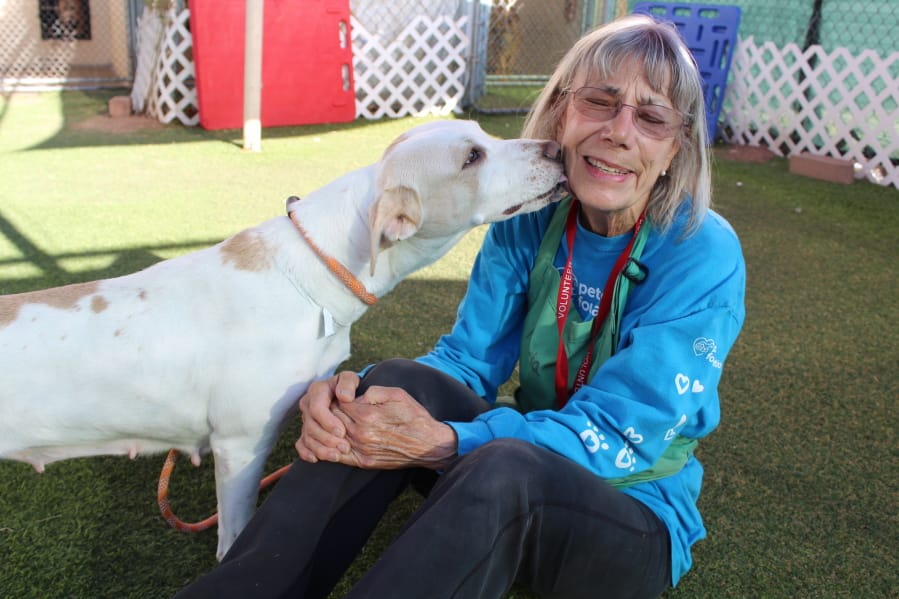PHOENIX — While your local pound works to find forever homes for many cats, dogs and other animals, volunteering is an easy way to improve their lives while they wait.
You can choose the kinds of activities that interest you, whether that’s walking dogs, cleaning kennels, reading to cats or creating social-media posts, to name just some of the options. There might be a short informational session or some hours of on-site training.
Many shelters ask volunteers to commit a certain number of hours per month, but say even the smallest act is appreciated.
“A successful volunteer is someone who loves animals and appreciates the fact that no matter what they do, how small their role might seem, it has a huge impact on the pets here at the shelter,” says Callista Pearson, marketing and development manager for Salt Lake County Animal Services, in Utah.
Five ways to volunteer:
Enrichment
Shelters are boring for animals. There’s lots of noise but little to do. Enrichment activities to keep them occupied include making and delivering food-puzzle toys, reading to them, sitting and petting them, or taking them on walks.
Volunteer dog walkers will probably be trained in leashing dogs, getting them in and out of their kennels, and managing them around other dogs.
At Maricopa County Animal Care in Phoenix, volunteers with the Petite Pet Project simply sit in a room with dogs and give them small treats and toys, letting the dogs socialize at their own pace.
“I love seeing them learn it’s OK to come out,” says volunteer Julie Jo Hughes. “The socialization of the dogs, getting them used to touch — it’s kind of like dog therapy.”
Cats might need help getting acclimated to a shelter so they won’t be nervous when potential adopters come by. Just by checking in on and petting cats, volunteers can help them learn to be calm during interaction with humans.
“The more comfortable a cat is with a person approaching the cage and putting their hand in there, the more likely they are to get adopted,” said Katy Hansen with the Animal Care Centers of New York City.
Foster
Fostering an animal can be great for someone who loves having a pet in the house but can’t guarantee a forever home. Fostering programs vary, but usually start with a conversation with a coordinator about what level of involvement and time commitment you’re willing to make. Fosters can take a dog for the afternoon, the weekend, or until they are adopted.
Pearson says the Salt Lake City shelter houses around 9,000 animals a year, and the constant noise and activity can be stressful for dogs. Having a quiet home to escape to for the day or weekend can help dogs relax.
Hansen says Animal Care Centers has a “Boroughbreak” program that lets people take a dog for the afternoon, and a “Stray-cations” program that allows people to spend a holiday weekend with an animal. “If you aren’t going anywhere for the long weekend, why not have an animal with you?” she asks.
Shelters also use fosters to house animals recovering from surgery or illness. “They’ll recover faster in that home than in the kennel,” Pearson said.
She added that fostering kittens or puppies, while time-intensive, makes it more likely those animals will be adopted quickly “because they’ve been now handled by people,” and “socializing pets is a huge thing.”
Cleaning
An important part of making shelter animals happy and healthy is keeping kennels clean.
“We all have to be willing to do some dirty work, because with over 700 dogs in our care on a daily basis, there is a lot of cleaning to do,” says Samantha Wessel, volunteer engagement coordinator at the Phoenix shelter.
Terri Sharp, a retiree who has volunteered at the Phoenix shelter for more than two years, starts her day checking on all the linens in the kennels.
“We also mop and clean as we go. It helps them thrive,” she says. “We want to give them every opportunity in here to succeed.”
Donations
Shelters always need donations, so consider setting up a collection box or fundraiser for much-needed goods. Consider bringing in a box to work or school and collecting toys, blankets and other items.
Lots of shelters have online wish lists too.
Social Media
Another way to help from home is by joining a shelter’s social media team, sharing or helping to run social media pages.
“Answering questions people post, writing bios … that’s just so helpful,” says Hansen.
Volunteers can design flyers, create templates and share ideas. “Good flyers can get shelter pets adopted quickly,” says Karen Hirsch of Lifeline Animal Project in Atlanta.



